International Technical Support Newsletter No. 18, July 2022
- Editorial
- PAS2 is On!
- Tunisia: Success of the New Base for National Accounts Project
- Interview with Pierre Muller and Louis Bê Duc, New Base project experts
- STEP: a success despite difficult deployment conditions
- Discovery of technical support missions in Armenia
- The new issue of Statéco, focusing on GPS
- A Summary of INSEE’s cooperation activities in the first half of 2022
- Regional activities
- Sub-Saharan Africa
- The Maghreb and Mediterranean Basin
- Europe and Asia
Editorial
The gradual lifting of the restrictions linked to the health crisis continued, allowing the establishment of a hybrid mode of technical cooperation focusing on on-site activities in synergy with virtual actions. A balance remains to be found, but a dynamic is under way and there is now a wider choice between the technical support methods the most appropriate to the objectives sought, the audience to be reached and the availability of experts.
This edition begins with the new Pan-African Statistics (PAS2) programme funded by the European Union, for which the start-up phase is an essential step in choosing the activities that will take place, their target audience and the establishment of the coordination team. Then, there is an update on completion of the New Base project with the National Statistical Institute (NSI) of Tunisia. It marks the completion of the base change in Tunisian national accounts and the integration of the new System of National Accounts (2008 SNA) after three years of bilateral cooperation with INSEE, which followed the European twinning operation between 2016 and 2018. This success is an opportunity to discuss the experience and assess the technical cooperation in general with the project experts.
The European STEP programme for the benefit of six countries to the east of the European Union will be completed soon, and we present an assessment of INSEE’s participation and interview our experts returning from Armenia about their experience of international technical support. Finally, this Newsletter presents the next special issue of the Statéco review on governance, peace and security, as well as a detailed list of activities undertaken in the second half of 2021.
Happy reading!
PAS2 is On!
The Pan African Statistics (PAS2) programme, funded by the European Commission, began in February for a period of approximately four years (2022–2025). The start-up phase of the grant projects in which INSEE participates, which ended at the end of June, had several objectives: (1) raise awareness in African Union countries about the project; (2) pre-identify, for each component, the countries that will benefit from the various activities; (3) establish classifications of NSIs from the perspective of their capacities and level of development in relation to the themes addressed (national accounts, among others); and finally (4) identify the country needs for each of these themes.
Five types of activities were implemented as part of the start-up phase, each of which contributed to one or more of these objectives: kick-off meetings; communication actions; meetings with international partners in African statistics; sending a questionnaire to African NSIs; and finally, two country missions.
Kick-off meetings with all the partners
Kick-off meetings for the two grant projects on economic and business statistics were organised at the INSEE head office from 1 to 3 March. These meetings were an opportunity to reflect on the coordination between the grant projects and the service contract (coordinated by Expertise France), as well as the preparation of the start-up phase. All European NSI partners (in addition to France, Denmark, Spain, Finland, Norway and Poland who were on-site) participated in the meetings, as well as Eurostat. All NSIs expressed the wish to be associated with the organisation of the hackathon on the use of alternative data sources, an activity proposed by INSEE covering the two grant projects.
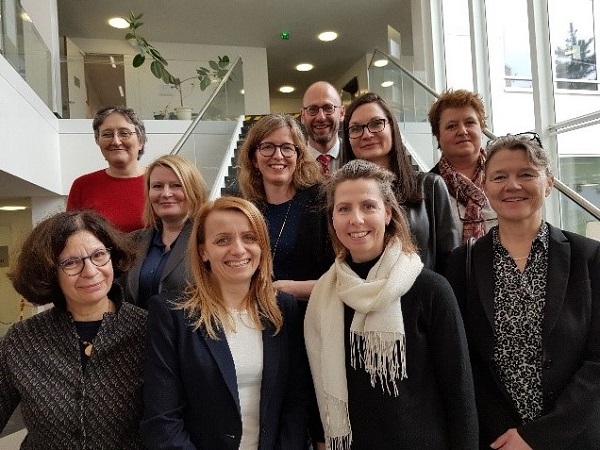
In the picture: Participants in the face-to-face kick-off meetings – representatives
of NSIs from Denmark,
Finland, Norway, Poland and INSEE. Representative of Eurostat
Representatives of INE (Spain), Eurostat, STATAFRIC and the Expertise France team
in charge of the PAS2
service contract were also present remotely.
Communication activities to raise the profile of the project
At the initiative of INSEE, a side event of the United Nations Statistical Commission was held on 14 March in collaboration with Eurostat and the African Union. This event (organised by videoconference) brought together 94 participants, including representatives from 24 African countries and 11 international and regional organisations. At the end of the event, a dozen countries expressed interest in participating in one of the grant projects.
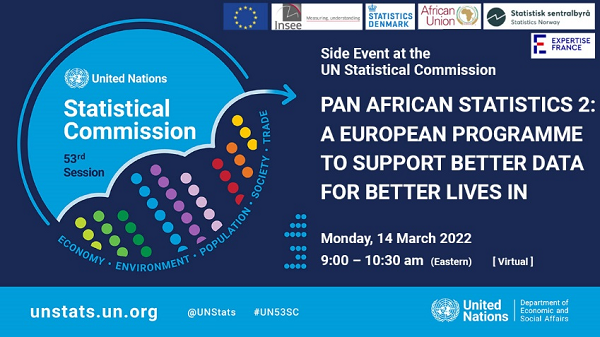
The programme was also presented at the last meeting of the Eurostat Management Group for Statistical Cooperation on 30 and 31 March. All the international cooperation departments of the European NSIs learned about the various components of the PAS2 programme.
Exchanges with International Organisations that are partners in African statistics
Bilateral virtual meetings were held with the following organisations: United Nations Economic Commission for Africa (UNECA), African Development Bank, PARIS21, AFRISTAT, IMF regional agencies in Africa (AFRITAC), World Bank, Global Partnership for Sustainable Development Data (DATA4SDG).
They helped identify the projects already benefiting African NSIs and understand the modes of stakeholder intervention. In the field of national accounts, they contributed to the development of a classification of countries based on several criteria (application of the 2008 SNA, a tool used for the production of accounts, ongoing developments and projects), which will be useful in determining the countries that will benefit from the various national accounting activities while avoiding duplication with the ongoing projects of other partners.
A questionnaire to African NSIs to confirm their interest in the project
A questionnaire devised by INSEE was circulated by STATAFRIC to the Directors General of African NSIs to enable them to propose the topics they would like to work on. Thirty six responses were received. They helped to develop a mapping of the countries, serving as a basis for virtual exchanges with the respondent NSIs to target their participation in the various types of activity.
Most of the activities are designed to initially reach a broad audience (online training open to all participants and presentation workshops). A second type of activity will address a smaller set of countries (study visits, specialised workshops) and lead to the selection of a small number of them that will benefit from bilateral technical assistance. At the end of the project, again, an opening will be offered to a wider range of countries in the form of experience-sharing workshops.
Two country missions
Two study missions were conducted by the coordinators of each of the two grant projects (INSEE and Statistics Denmark) in Senegal and Rwanda. The evidence gathered during these missions in these two countries, taken as examples, will help to refine and guide the planned support (including the content of training courses) to address as closely as possible the concerns of our African partners. Thus, during the mission in Senegal, activities have been precised on national accounts and business registers, in which ANSD is in the lead. Exchanges with the National Institute of Statistics of Rwanda (NISR) have also enabled progress to be made in preparing planned activities on alternative sources of data, the NISR being labelled the “ regional data centre” for Africa as part of the United Nations big data platform.
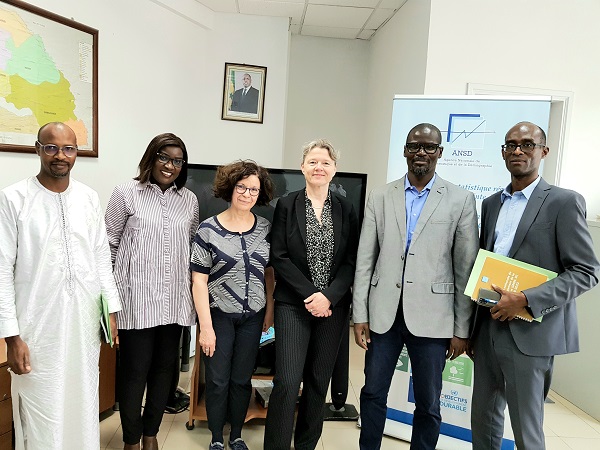
From left to right: Oumar Dia (ANSD), Awa Diop (DG advisor and communication manager,
ANSD),
Dominique Francoz (Insee), Nina Von Lachmann Steensen (Statistics Denmark),
Alle Nar Diop (Directeur général of ANSD), Meissa Ndour (ANSD)
Tunisia: Success of the New Base for National Accounts Project
At the end of 2021, the Tunisian NSI successfully changed its national accounts database (from 1997 to 2015–2016) and integrated the new system of national accounts (the 2008 SNA), which was the primary objectives of the New Base project undertaken with INSEE and the Banque de France in 2019 as a follow-up to a European twinning. Despite the difficulties associated with the health crisis, this success has been made possible by the competence and involvement of NSI staff and experts who came to support them: Pierre Muller, Honorary Inspector General of INSEE, and, for the financial accounts, Louis Bê Duc, Cooperation Manager at the International Banking and Finance Institute of Banque de France.
The New Base project aimed to support Tunisia in the completion of the work undertaken during twinning with INSEE, ISTAT (Italian National Statistical Institute) and Statistics Lithuania between February 2016 and April 2018, with the contribution of Banque de France and funding from the European Union.
This work was a priority for the NSI: the previous base year was very old (1997), the implementation of the recommendations of the new worldwide system of national accounts (2008 SNA) was necessary, and it was important to improve the consideration of activities of the informal economy.
The base change concerned the accounts of the institutional sectors and subsectors (non-financial and financial) and the accounts for goods and services as well as the summary processes of the various types of operations, the summary tables (SUT, TIEA and TOF) and the assessment of aggregates (GDP, national income etc.). Tunisian financial accounts now include major sources, such as the exhaustive exploitation of the accounts of the main Tunisian companies for both listed and unlisted shares, and result for the first time in the production of a comprehensive financial wealth account for all sectors, in addition to relations with the rest of the world.
The project has also resulted in short-, medium- and long-term recommendations, such as the preparation of complete balance sheet and the establishment of new or enriched satellite accounts (tourism, environment etc.). Some of these recommendations will be further supported by the INSEE in 2022 and 2023, in a new project led by Pierre Muller.
Extended for one year due to the health crisis, the project has been the subject of four missions to Tunis and numerous videoconferences and remote exchanges totalling more than 30 person-days in three years from 2019 to 2021. It illustrates the importance of bilateral, multi-year projects to ensure the sustainability of large-scale projects, such as European twinning, and to complete or implement the recommendations from these projects.
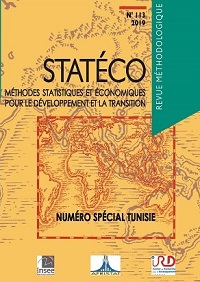
No. 113 of the Statéco review (2019) is devoted to Tunisia and provides an update on European twinning with the NSI
Interview with Pierre Muller and Louis Bê Duc, New Base project experts
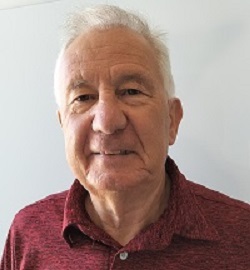
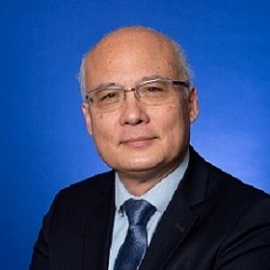
The New Base project followed the European twinning, which was completed in April 2018. How did you manage the continuity of the two projects and the conversion of activities into remote exchanges to cope with the health crisis?
Pierre : The continuity was natural since New Base was concerned with the finalisation of part of the twinning activities, which resulted in an abundance of documentation. There was also human continuity, experts on the INSEE side and, partially, teams on the NSI side.
With regard to remote activities, short and regular meetings made it possible to keep in touch during the health crisis, even though a year was lost: the work I had to do was not really suitable for remote activities.
Louis : Regarding the financial accounts I was responsible for, continuity was helped by the fact that contacts had been made with data providers during twinning, with the set-up of queries to suppliers that could be used in a complementary manner from the launch of the New Base project. In addition, I was able to carry out an on-site mission at the beginning of the project just before the travel restrictions caused by the Covid crisis. The remote activities therefore focused on working files and allowed progress under good conditions. Moreover, this remote technical assistance was adopted for broad use at Banque de France during the pandemic.
What are the advantages and disadvantages of a multilateral project such as a twinning compared with a bilateral cooperation project?
Pierre : Twinning is tightly structured and a good formula for setting up a scheme, with good resources and strong ambitions over a short term. On the other hand, the set-up and running-in time is longer than with bilateral cooperation, which is more flexible and adaptable.
Louis : The benefit of a twinning or multilateral project is also being able to involve several institutions and thus use a larger pool of resources.
Louis, during the project, you were in charge of cooperation at the International Banking and Finance Institute (IBFI) of Banque de France. How does a joint project with INSEE, such as New Base fit with IBFI’s cooperation?
Louis : IBFI technical support actions are most often used in multilateral programmes (under the aegis of the IMF or the EU). We are also trying to collaborate with French experts. New Base fell entirely within this approach: a major partner like Tunisia, with which we have a cooperation agreement (for the central bank), a collaboration with INSEE, a key player in French official statistics, and Expertise France, in a continuation of a European project.
How do you see the evolution of the technical cooperation?
Pierre : For about seven years in the 1980s, I helped to set up the first generation of Tunisian accounts. It was a bilateral cooperation with INSEE led by André Vanoli, already with Banque de France. Cooperation didn’t look like it does today: technical experts went on longer missions, from three weeks to a month on site, not a week like today. There was significant support from the French embassy in Tunisia.
I would say that statistical cooperation is expected to grow because the needs are numerous, but that at least two conditions must be met: first, recipient institutions have enough availability, with sufficient stability of local teams, including managers; and second, providers have the means to support them. Let me remind you, for example, that a good number of the French experts involved in the Tunisian NSI twinning were INSEE retirees: the workload at INSEE seems high and adds to an increasingly pressing European call for cooperation in the broader sense. And today, there are problems with both supply and demand. In addition, the perception of cooperation by INSEE executives is no longer the same as before, even if the new generations are more open and interested. Digitisation can breathe life into it by allowing experts to mobilise over short periods, but it doesn’t allow everything to get done.
Louis : I find that digital technology opens up new possibilities for cooperation: it allows you to reach more people and respond flexibly to requests for technical support. Digital technology has developed extensively at IBFI and we have tripled the number of participants in training seminars since the pandemic. This is an opportunity and part of the development of multilateral collaborations. It also makes it possible to compensate in some cases for the lack of availability of personnel for on-site missions. IBFI has also increased the dissemination of video replays and e-learning modules based on its actions. Regarding the promotion of external cooperation actions, although the resources of the various trades may be limited, participation in these actions remains valued, in any case IBFI works to promote it internally.
You led the project together, each in your area of responsibility. What do you take away from this collaboration?
Pierre : It was very positive, in both substance and form. There is continuity in the INSEE strategy to associate with Banque de France because real importance is attached to the financial accounts and their linkage with non-financial accounts, which was able to be addressed with New Base. And Louis and I completely understood one another.
Louis : It was a very good experience, and indeed I got along very well with Pierre. I learned a lot about methodology with him. There was good communication between us, on the spot with joint meetings and through mission reports, which we each wrote quite comprehensively for our respective remits.
What are the keys to the success of a project like New Base?
Louis : I would say the completion of a medium-term project (running between 2016 and 2018 for twinning and 2020 and 2021 for New Base) which allowed for consistent action, building trust with existing teams, engaging other data providers and sustainable skill transfer.
Pierre : For a bilateral action following on from a twinning, the first key is a good understanding of what has been done: extensive and precise technical documentation helps to reduce the project start-up costs. The second key relates more to good knowledge of international systems, including less known parts, such as satellite accounts in national accounts. Finally, in third place, it’s essential to set realistic goals with respect to a situation, but ones that are still ambitious.
What were your motivations for participating in this project?
Louis : I wanted it to be a great experience for me and to allow me to combine (as is desirable at the IBFI) organising trainings with technical support actions in my area of responsibility. It was very enriching, also thanks to the people I met with, who made it possible.
Pierre : I have a real taste for cooperation, which seems to me essential for an INSEE executive and particularly for a national accountant. I had good memories of the Tunisian NSI and the quality of its executives. Moreover, New Base allowed me to go beyond traditional cooperation on the central framework of national accounts: completing an accounting development process was new. Finally, it allowed the twinning to be completed. The goal to change the base in two years was unrealistic: it needed four or five years and that’s what happened.
What would you say to a junior expert who is tempted by international cooperation activities?
Louis : Cooperation is useful to institutions, as well as very enriching from a personal perspective. It requires adaptation to the situations and needs of partner institutions, without wanting to ditch the system of your own institution, it needs you to be curious and pragmatic. This can be a plus in a professional journey because it’s a mark of openness and dynamism, and it helps to create useful contacts with partner institutions (beneficiaries or providers of technical support).
Pierre : Aside from your own endeavours, to make progress, there are international discussions, which are very interesting. There’s also international cooperation, which is very different: less formal, less conceptual and takes more time. It has its requirements: field missions are important, even if they are short and infrequent. You must prepare for them, learn the statistical status of the country and know the international standards from which the national systems are derived. You learn your job by facing other experiences.
STEP: a success despite difficult deployment conditions

We could not start this article without mentioning our shock and sadness in the face of the current situation in Ukraine, a Member State of the STEP programme. We would like once again to express our support and solidarity to our Ukrainian colleagues and their families. We have been admiring those who continued to work and participate in online activities despite these extremely difficult circumstances. Belarus had withdrawn from participation in the STEP programme in January 2022 after the suspension of its participation in the Eastern Partnership last summer.
On 31 July, the STEP programme - Ouvrir dans un nouvel ongletStatistics for the Eastern Partnership - will be completed. Since its launch in January 2019, more than 70 training courses, workshops and study visits, as well as some 30 technical assistance missions, have been organised for the benefit of 6 countries in the eastern neighbourhood of the European Union: Armenia, Azerbaijan, Belarus, Georgia, Moldova and Ukraine. Yet, between the global Covid-19 crisis and the very difficult regional context, the ideal conditions for successful rollout were not met. The programme has adapted well by conducting a large part of its activities online and requesting an extension of the implementation period (initially scheduled to end on 31 October 2021).
INSEE was one of the driving force behind the project, alongside the Italian, Danish, Hungarian and Lithuanian NSIs, under the coordination of Expertise France. France contributed to 14 activities, most of which were carried out through videoconferencing. The main focus areas were business statistics, national accounts, and the quality and governance of the NSIs. Although the online mode predominated, two activities were still held in person: more than two years after a study visit at the end of 2019 in Montrouge, France, a technical assistance mission on the management of micro-data from the Labour Force Survey was held in 2022 at Armstat in Armenia (Julien Jamme and Clément Guillo, see interview below).
The final stage of STEP have been the organisation of the closing event, which provided an update on all the progress made in this partnership. For more information and to view some of the programme outputs, please visit the Ouvrir dans un nouvel ongletSTEP program website.
Discovery of technical support missions in Armenia
Interview with Clément Guillo and Julien Jamme
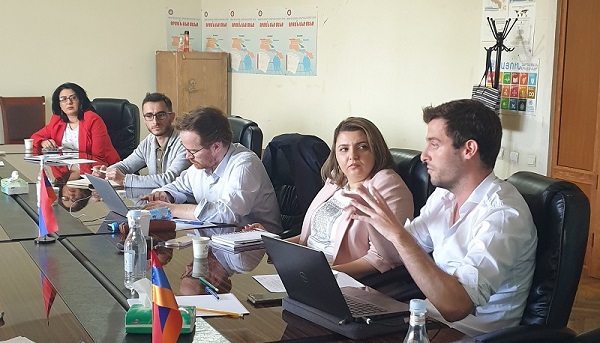
From left to right : the Armstat team (NSI of Armenia), Julien Jamme (Insee),
Fenya Yepremyan (interpreter) and Clément Gillo (Insee)
What were your motivations for conducting this mission in Armenia?
This cooperation mission was suggested to us at the beginning of the year by the International Coordination department and dealt with the anonymisation of micro-data. We saw an opportunity to meet other professionals who are facing the same problems as us. This was an opportunity for us to get together, discuss and exchange our knowledge of anonymisation gained as part of our methodological work. Moreover, Armenia seemed to us to be a very attractive destination.
What did you draw from it professionally and personally?
We had a very enriching exchange with the teams of statisticians at Armstat. They were very receptive to the content we put forward to them. Their reactions and questions were relevant and sharp, which allowed us to gain more depth on what we were presenting. We felt that we were helpful. We were warmly welcomed by the teams on arrival and the atmosphere over the three-day period was very pleasant. We were very grateful for this.
How is this type of collaboration specific to you and complementary to your usual work?
In our section, “Methods for spatial statistics and statistical confidentiality”, we are in constant contact with the data producers facing the problem of statistical confidentiality of tabulated data. The mission in Armenia enabled us to play an advisory role on issues of anonymisation of micro-data. Our contacts, who were mostly new to the subject, were expecting us to make concrete proposals and provide general concepts that would allow them to anonymise any kind of micro-data. We therefore took a more strategic position than usual for this mission. We should also thank the interpreter (English into Armenian), who was able to successfully communicate all the concepts, ideas and codes that we presented.
The new issue of Statéco, focusing on GPS
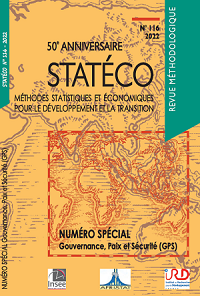
Statéco is celebrating its 50th anniversary this year. This special issue is devoted to statistics on governance, peace and security (GPS). It includes 11 articles written by 25 authors from countries on 3 continents: Africa (Cameroon, Cape Verde, Côte d’Ivoire, Madagascar and Mali), America (Brazil, Canada and Peru) and Europe (France). The authors are researchers (economists, political scientists etc.), executives within international organisations and statisticians.
The articles in this issue are grouped into four parts. Those in the first part emphasise the need to combine institutional and technical advances to consolidate the place of GPS data in national statistical systems. Those in the next part deal with methodological challenges raised on account of assessing aspects of governance. Finally, the articles presented in the third and fourth sections illustrate how GPS statistics can deepen understanding of analytical issues.
This theme is important to INSEE and the French Official Statistical Service, as shown in the foreword signed by the Director-General of INSEE and the article in this issue prepared by statisticians of the Ministerial Statistical Department for Internal Security. This text is dedicated to the Ouvrir dans un nouvel ongletnew annual victimisation survey launched by this department in 2022. It replaces the Living Environment and Security survey conducted annually since 2007 in partnership with INSEE, which is one of the oldest regular surveys on these issues worldwide. In addition, France is closely following the work of Ouvrir dans un nouvel ongletthe Praïa group on governance statistics,, to which the first article of this special issue is dedicated.
To celebrate the release of this special GPS issue of the Statéco review, a videoconference was held on 31 May and 1 June 2022. The presentation of the articles by their authors brought together more than 100 participants from the international scientific community (researchers, statisticians, political scientists, sociologists, policymakers etc.) from French-speaking African countries, Algeria, Morocco and Tunisia, as well as Latin American countries and France.
The Statéco GPS special issue is available here on the INSEE website.
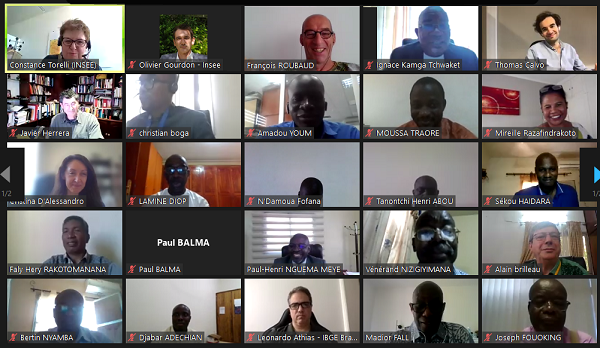
Participants in the 2nd day of presentation of the Statéco GPS special issue, 1 June 2022
A Summary of INSEE’s cooperation activities in the first half of 2022
Regional activities
-
Cycle of INSEE Thematic Conferences – AFRISTAT – PARIS21 – UNECA
Webinars in connection with the Covid-19 crisis
French-speaking countries in sub-Saharan Africa and the Maghreb region
- Ouvrir dans un nouvel onglet8thwebinar: mic censuses and business registers: strategies implemented and why?
February
- Ouvrir dans un nouvel onglet9th webinar : building better data on gender in Africa: challenges and opportunities
June
-
INSEE - AFRISTAT
Peer review of the official statistics system: a powerful driver of quality:
- Peer visit: preparation of NSIs and national statistical systems (both in advance and during the visit)
- The audit report and recommendations: ownership and communication by NSIs within the national statistical system
- Implementation of the action plan: challenges and issues for official statistics
Panel with the directors general of the NSIs of Benin, Tunisia, AFRISTAT and INSEE
June
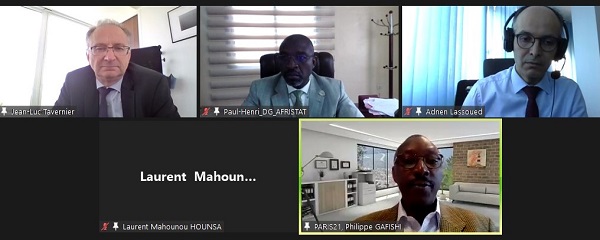
Panel of directors general: Jean-Luc Tavernier (INSEE), Paul-Henri Nguema Meye (AFRISTAT),
Adnen Lassoued (Tunisia), Laurent Mahounou Hounsa (Benin)
Moderator: Philippe Gafishi (PARIS21)
Sub-Saharan Africa
-
AFRISTAT – EXPERTISE FRANCE- INSEE- FERDI- DGFiP - DGDDI
Study visit on information and communications technology (ICT) survey methodologies as part of the regional project tosupport the strengthening of digital economy statistics and the use of data science by tax and customs administrations (DATAFID)
Visit
June
-
AFRISTAT
Participation in the Statistical Leadership training course held in Kigali (Rwanda)
Regional workshop
May
-
SENEGAL
Presentation of the National Directory for the Identification of Natural Persons
(« répertoire national d’identification des personnes physiques – RNIPP »).
Visit
May
-
MAURITIUS
Visit by Dr Renganaden Padayachy, Minister of Finance, Economic Planning and Development
March
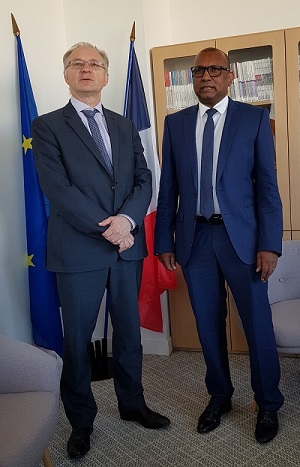
M. Jean-Luc Tavernier, Director general of Insee,
and Mr Dr Renganaden Padayachy, Minister of Finance,
Economic Planning and Development
The Maghreb and Mediterranean Basin
-
ALGERIA, MOROCCO
The international standard for the exchange of SDMX information
National Office of Statistics of Algeria, Morocco High Commission for Planning
Training by videoconference
May
-
ALGERIA
Keys to preparing an infographic for the web
Aims of infographics, writing techniques for infographics, referencing; practical implementation
Training by videoconference
March
-
MAROCCO
Hakama II Project

Three-year capacity-building project of the High Commission for Planning, with three components:
1. Strengthening of the Technical Capabilities of Outside Services
Communication – establishment of satisfaction surveys
Lime Survey training
Videoconference, remote discussions
January
Strengthening capabilities in conducting surveys
Establishing a local survey on unemployment
Mission at the Eastern Region Directorate (Oujda)
March
Governance – establishment of an organisational scheme/support for the gradual automation
of exchanges with producers
Communication – improving and standardising publications
Videoconference, remote discussions
January-June
2. Introduction of Mixed-Mode Surveys
Pilot survey on employment via telephone
Mission to Rabat, videoconferences, remote exchanges
January-June
3. Overhaul of the System for Producing Business Statistics
Recasting structural investigations: use of administrative resources, general review
of methodologies, implementation of a pilot survey, training in R
Two missions in Rabat; videoconferences, remote exchanges
January-June
Technical Committee of the Hakama II project.
Mission to Rabat
March
Participants in the Hakama II Technical Committee in Rabat on 10 March 2022
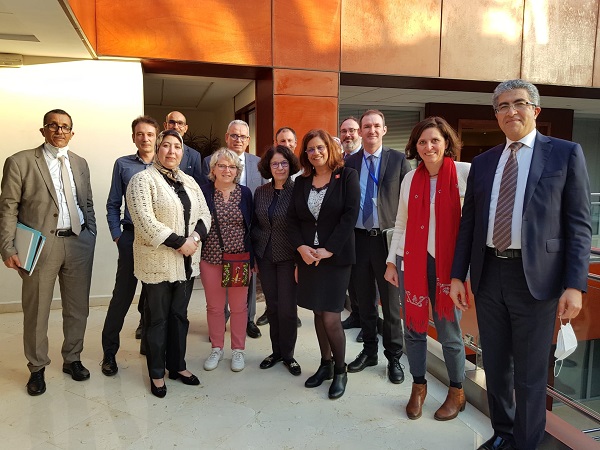
Composite Business Climate Indicator
INSEE composite indicators: overview and methodology
Set-up of a composite business climate indicator at HCP
Videoconference
April
-
TUNISIA
Identification Process for the Implementation of ERETES, a National Accounting Application
Presentation of the operation of the system to Tunisian national accountants, proposal for an organisation to prepare Tunisia’s annual national accounts
Mission in Tunis
June
Europe and Asia
- Statistics Through Eastern Partnership (STEP)
Managing labour force survey (LFS) micro-data
Presentation of French methods of anonymisation and protection of micro-data,
audit and recommendations on the Armenian method
Mission in Yerevan, Armenia
May
Workshops on demographic statistics
Presentation of the French experience, exchange and analysis of practical cases
on population registry management and on the methodology of demographic projections
Online workshops
May
Statistical business register
Online mission to examine and explore methodologies to identify fast-growing
businesses and businesses created by young entrepreneurs in Georgia
Videoconferences
May
Business Statistics
Online mission to establish diagnostics and produce specific recommendations
for aligning Azerbaijan's business statistics with European and international standards
Videoconferences
May
- TURKEY
Production prices
Mission on production price index in the construction sector
Ankara
June
- UKRAINE
Conference of the International Association for Official Statistics (IAOS)
Funding for the participation of three Ukrainian colleagues at the Ouvrir dans un nouvel ongletIAOS 18th Congress in Krakow entitled “Worthy Information for Challenging Times”
Conference
April


